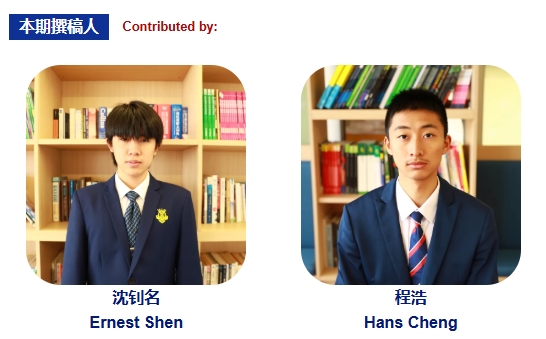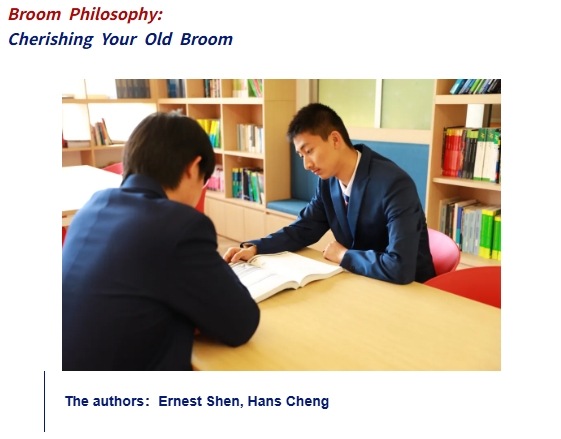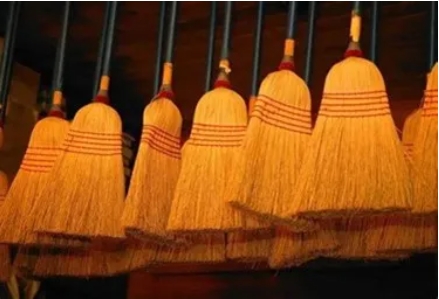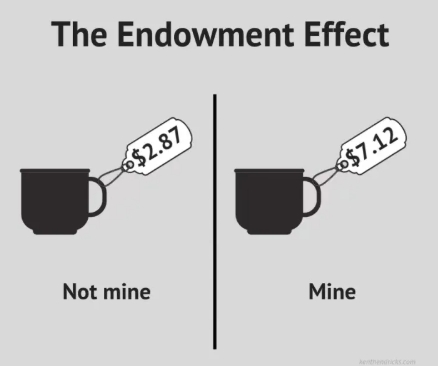
各位读者们好,《The Insider 洞察者》作为学校最具影响力的刊物,从内容到成品,全程由英华学子自主策划、编写和制作。旨于舒展学生个性、发扬兴趣特长,通过探索未知的领域提高学生的创新和学习能力并结合多姿多彩的校园生活,撰写出优秀的刊物。
Dear readers, as The most influential publication of the school, The Insider Insight is independently planned, written and produced by Yinghua students from the content to the finished product. It aims to stretch students' personality, develop their interests and specialties, improve students' innovation and learning ability by exploring unknown areas, and combine the colourful campus life to write excellent journals.


承电视肥皂剧的优良传统,我们将给您一个悬念!“探访管理层 ”三部曲即将迎来完美的结局-- Mark校监的访谈,已经完成、撰写、拍摄并准备就绪......
期待吗?那就继续保持期待吧!
本期 “内幕 ”将由来自 AS 的Ernest和Hans强强联手,为您带来全新的体验和视角。他们将推翻固有思维,从哈利波特的飞天扫帚中打开 “珍惜你的旧扫帚 ”背后的原理和心理学!
尽情享受!
编辑:鲜甜
In the best tradition of TV soap operas, we’re giving you a cliff-hanger! The final installment of the “Meet the Leader” trilogy - and the perfect finale - Mark's interview, is done, written, photographed, and ready to go…
Looking forward to it? Then look forward to it as we are keeping you on tenterhooks*!
This edition of Insider features a new experience and a fresh perspective from the powerful combination of Ernest and Hans from AS. They'll push the envelope and tell you about the principles and psychology behind “cherishing your old broom” from Harry Potter’s flying broom!
ENJOY!
* “Tenterhooks” comes from the textile industry, where a “tenter”was a wooden frame used to stretch cloth after weaving. The cloth would be attached to the frame using hooks (tenterhooks) to prevent it from shrinking as it dried.
So when someone is "on tenterhooks," they're in a state of suspense, tension, or anxious anticipation - metaphorically stretched and held in place like cloth on a tenter frame.
From the editor: Sheela

你愿意为一把飞天扫帚出多少钱呢?一万美元?五百美元?还是仅仅八美元?对于哈利·波特来说,它绝对价值不菲,但对我们这种不会分辨的人而言,它可能只值八美元。这表明,同样一把扫帚,仅仅因为其所有者的不同,就可以具有不同的价值。但是,你愿意为哈利波特用过的扫帚支付多少钱呢?我估计肯定会超过八美元。

是什么赋予了这把扫帚不同的价值呢?显然,是它的主人——哈利。我们不是哈利,人们也不会为我们的扫帚支付更高的价格,那么从我们自己的角度来看呢?我们是否会给我们个人使用的物品赋予特殊的价值呢?塞勒首次提出的禀赋效应表明,与那些他们没有拥有的相同物品相比,人们会给他们所拥有的物品赋予更高的价值。但真的是这样吗?

受这个问题的驱使,汉斯和我决定进行一项深入的实验,以检验禀赋效应。我们精心地招募了三个不同的参与者小组。A 组收到了扫帚,这些扫帚虽然没有魔法,但却是简单而实用的物品。B 组得到了笔记本,这是大多数人都熟悉的常见文具。C 组作为对照组,一开始没有收到任何这些物品。在让 A 组和 B 组的成员与他们所分配到的物品进行 15 分钟的密切接触和使用后,我们为每个小组设计了不同的问卷。这些问卷不仅探究他们对物品的最初印象,还探究在短暂使用物品后的感受变化。例如,我们询问他们放弃该物品的可能性有多大,他们会给该物品定价多少,以及他们觉得哪些特征最吸引人或最不吸引人。为了整合所有的统计数据,我们使用了先进的数据分析技术,仔细筛选回答,以便就人们是否真的更珍视他们得不到的东西得出有意义的结论。
在煞费苦心地分析了这三份问卷后,我们有了一个有趣的初步发现。大多数被调查者都认为,在使用一段时间后,物品的价值会发生变化。这似乎初步支持了这样一种观点,即存在某种基于个人与物品互动的价值调整。然而,出乎意料的是,我们实验的最终结果着实令人惊讶。结果与我们最初形成的假设完全相反。我们原本认为,A 组的人会觉得他们用过的扫帚的价值有所增加,因此会不愿意用它们来交换笔记本。基于禀赋效应的概念,我们预期对扫帚的拥有感会使他们给这些物品赋予更高的价值。然而,实际上,令人震惊的是,80%的人实际上都渴望用扫帚交换笔记本。当我们深入探究他们的理由时,我们发现他们认为笔记本更有价值。与扫帚相比,笔记本能提供知识、娱乐以及更广泛的体验,而扫帚在他们的日常生活中实际用途有限。

是什么导致了这种完全相反的现象呢?或者更确切地说,是什么让人们违背了禀赋效应呢?事实上,这是因为人们未能正确运用或对价值判断的标准不够敏感。这到底是什么意思呢?人们常常过度强调他们所缺乏的东西的价值,却对他们已经拥有且真正重要的东西的意义视而不见。当一个物品为某人所拥有时,人们会产生一种掌控感。这意味着,由于他们知道自己仍然拥有它,它的重要性可能不会被有意识地注意到。例如,一个人可能有一本珍藏多年的旧书,一直放在书架上。他们知道它一直在那里,所以可能不会过多去想它对自己的思维产生了多大影响,或者在困难时期给予了多少安慰。相反,当一个物品不属于某人时,人们就缺乏这种拥有感。结果,在他们的潜意识里,他们不断强化和放大对该物品的渴望。一个人可能在家具店看到一张稀有且昂贵的咖啡桌,然后在脑海中想象它会以各种美妙的方式改变自己的客厅,却忽略了他们现在那张实用的咖啡桌已经很好地为他们服务了多年这一事实。
这种心理倾向有着深远的影响,尤其是在人际关系领域。这就是为什么有那么多婚姻关系不稳定的原因之一。其中一个关键原因是,一方可能没有给予另一方足够的关注,未能准确评估配偶对自己的价值。丈夫可能会把妻子在操持家务、做饭和照顾孩子方面的日常努力视为理所当然。他可能更关注那种迷人但难以企及的不同关系的想法,或者更令人兴奋的生活方式,而没有意识到他已经拥有的东西的真正价值。同样,妻子可能会忽视丈夫为养家糊口所付出的努力以及在困难时期给予的情感支持,反而渴望电影中看到的浪漫举动,或者想象从别人那里得到关注。通过理解这些潜在的心理机制,我们能更好地认识到珍视我们所拥有的东西的重要性,并且更加清楚我们那些错误的价值判断。

所以,对人们来说,拥有一把飞天扫帚可能意义重大,即使我们不会使用它,而且已经拥有了一把更实用的扫帚…… 关于禀赋效应的实验揭示了一个有趣且与直觉相悖的真相。我们原本认为人们会更珍视自己所拥有的东西,这是一个明确的情况,但结果却发现这是一个关于感知价值和实用性的复杂相互作用。
飞天扫帚不是人人都能有,但人人都能成为自己世界里的哈利波特。

How much would you pay for a wizardly broomstick? Ten thousand dollars? Five hundred? Or just eight dollars? For Harry Potter, it's absolutely worth a fortune, but for us, it's worth only eight dollars. This shows how the same broom can have different values, simply because of who owns it. However, here is a new question: "How much would you pay for the broomstick used by Harry Potter?" Must be for more than eight dollars.
What bestow the different value for the broom? Obviously, its owner — Harry. While we're not Harry, and people wouldn't pay more for our brooms, what about our own perspective? Do we assign special value to the things we personally use? The Endowment Effect, first identified by Thaler (1980), shows that people place higher value on items they own compared to identical items they don't own. Is this really the case?
Driven by this intriguing question, Hans and I decided to conduct an in - depth experiment to test the Endowment Effect. We went through a meticulous process of recruiting three distinct groups of participants. Group A received brooms, which, while not magical, were simple yet serviceable items. Group B was given notebooks, common stationery items that most people are familiar with. Group C served as the control group, not receiving any of these items initially. After allowing the members of Group A and Group B 15 minutes of close contact and use with their assigned items, we crafted different questionnaires for each group. The questionnaires were designed to be comprehensive, probing not only their initial impressions but also their evolving feelings towards the items after the short period of use. For example, we asked about how likely they were to part with the item, what price they would assign to it, and what features they found most appealing or unappealing. To integrate all the statistical data, we used advanced data - analysis techniques, carefully sifting through the responses to draw meaningful conclusions about whether people truly value what they can't get more.
After painstakingly analysing the three questionnaires, we made an interesting initial discovery. Most informants agreed that items will change in value after they had used them for a period. This seemed to initially support the idea that there is some form of value adjustment based on personal interaction with an item. However, unexpectedly, the final result of our experiment was truly astonishing. The results were completely contrary to the hypothesis we had initially formed. It was assumed that the people in Group A would perceive an increase in the value of their used broomsticks and thus be reluctant to exchange them for notebooks. Given the concept of the Endowment Effect, we expected that the sense of ownership over the broomsticks would make them place a higher value on these items. However, in reality, a staggering 80% of them actually desired to exchange for books. When we delved deeper into their reasons, we found that they considered the books to be more valuable. The books offered knowledge, entertainment, and a broader range of experiences compared to the broomsticks, which had limited practical use in their daily lives.
What could cause this totally contrasting phenomenon? Or, more precisely, what makes people violate the Endowment Effect? In fact, it is because people have failed or are not sensitive enough to the criteria of value judgment. What does that mean exactly? People often over - emphasize the value of things they lack, yet turn a blind eye to the significance of the things they already possess and that are truly important. When an object is in one's possession, people develop a sense of control. This means that since they know they still have it, its importance might not be consciously noted. For instance, a person might have a well - loved old book that has been on their shelf for years. They know it's always there, so they might not think much about how much it has influenced their thinking or provided comfort during difficult times. Conversely, when an item does not belong to someone, people lack this sense of ownership. As a result, in their subconscious, they constantly intensify and magnify their yearning for that item. A person might see a rare, expensive coffee table in a furniture store and build up in their mind all the wonderful ways it would transform their living room, ignoring the fact that their current, functional coffee table has served them well for years.
This psychological tendency has far-reaching implications, especially in the realm of human relationships. That is why so many marriages are unstable. One of the critical reasons is that one partner may not pay sufficient attention to the other, failing to accurately assess the value that the spouse holds for them. A husband might take for granted his wife's daily efforts in maintaining the household, cooking meals, and caring for the children. He might be more focused on the glamorous, unattainable idea of a different kind of relationship or a more exciting lifestyle, not realizing the true worth of what he already has. Similarly, a wife might overlook her husband's hard work to provide for the family and his emotional support during tough times, instead longing for the romantic gestures she sees in movies or the attention she imagines she would get from someone else. By understanding these underlying psychological mechanisms, we can better appreciate the importance of valuing what we have and being more aware of our misguided value judgments.
So, in fact, having a flying broom is of great importance to people, even if they don't use it and already possess a more practical broom. The experiment on the Endowment Effect has revealed a fascinating and counter-intuitive truth. What we thought would be a clear-cut case of people valuing what they own more highly turned out to be a complex interplay of perceived value and practicality.
Let us cherish our “old brooms” and the people associated with them, for they may be the most valuable things we will ever own.
Reference:
Thaler, R. H. (1980). Toward a positive theory of consumer choice. Journal of Economic Behavior & Organization, 1(1), 39-60.
